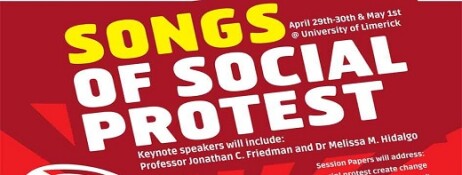My major task for this week was collating, distributing and editing third draft chapters from contributors to a co-edited project I’ve been working on for the past eighteen months, entitled ‘Songs of Social Protest’. The book is one of the major planned outputs following the hosting of an international conference in April-May 2015 in University of Limerick, entitled ‘Songs of Social Protest’ which was co-organised by two research clusters I’m part of - PMPS@UL (Popular Music and Popular Culture http://ulsites.ul.ie/pmpc/) and PDS@UL (Power, Discourse and Society http://ulsites.ul.ie/pds/).
After the conferences, my co-organisers and I put out a wider call for chapter submissions for an edited collection on protest songs, having secured a contract with Rowman and Littlefield International publishers in their ‘Protest, Media, and Culture’ series https://www.rowmaninternational.com/our-publishing/series/protest-media-and-culture/ . The process of putting a book together takes a long time, and even more so when over thirty contributors are involved, covering different genres of music, from various geographical locations and historical eras. A quick sample includes African American spirituals and protest songs from the folk revivals in the UK and US; LGBT protest songs; songs from ethnic minorities in various parts of the world, protesting against caste systems or systematic exclusion; protest and propaganda songs from separatist nations; songs critiquing neoliberal agendas. When we proposed the book, the world was a somewhat different place (pre-Trump, pre-Brexit, pre-Hong Kong democracy challenges, etc.), so it has been interesting and challenging to keep the book on its original path and not to constantly feel each chapter has to respond to rapidly changing events. At the same time,this has made us aware of the importance of the project.
With four editors working on the collection, it makes things easier if we divide up the chapters for editing by drawing upon our respective areas of expertise. We then rotate chapters to ensure consistency. My fellow editors, Martin Power, Eoin Devereux, and Amanda Haynes are based in sociology (I’m an ethnomusicologist) and have a lot of experience in writing and editing. We have worked together on projects before so we know we can rely on each other. The drafts I’ve been distributing this week are all in good shape, having had two previous interventions in terms of structure, style, and content. The most important intervention we had to make with our international group of contributors, who range from PhD students to professors, was to ensure they wrote their respective chapters for an international audience and made it clear precisely how they framed their work in relation to protest (music) literature. It might seem obvious but it has proven to be surprisingly challenging for some.

Published: 13 Jul 2017 Categories: Cultural Studies, Ethnomusicology, The Busy Season

